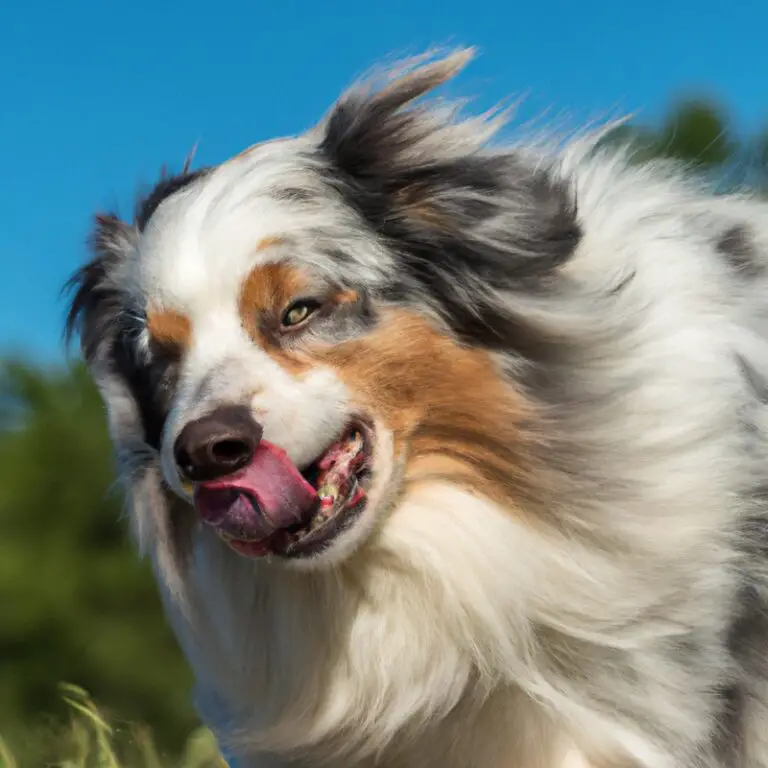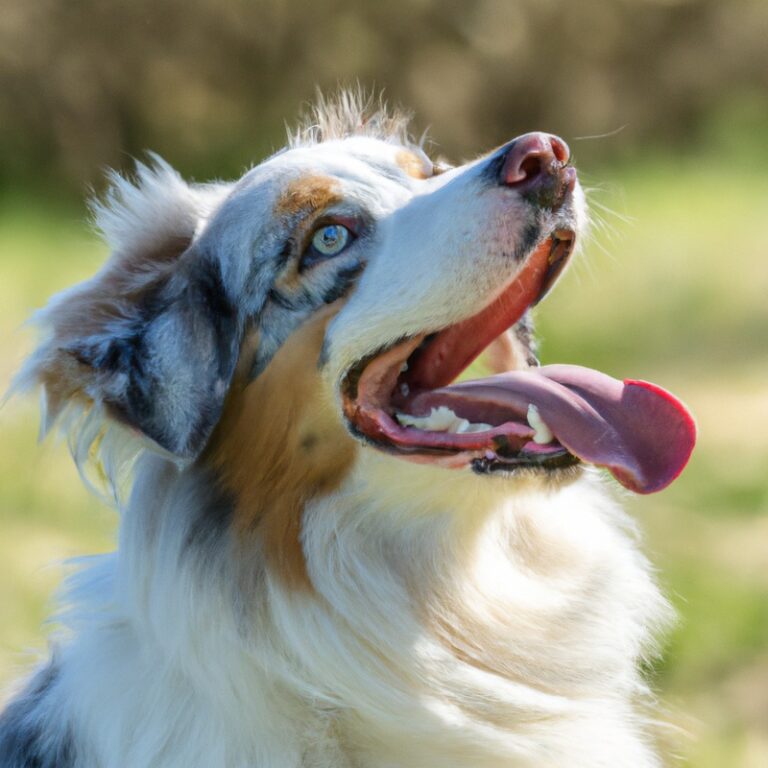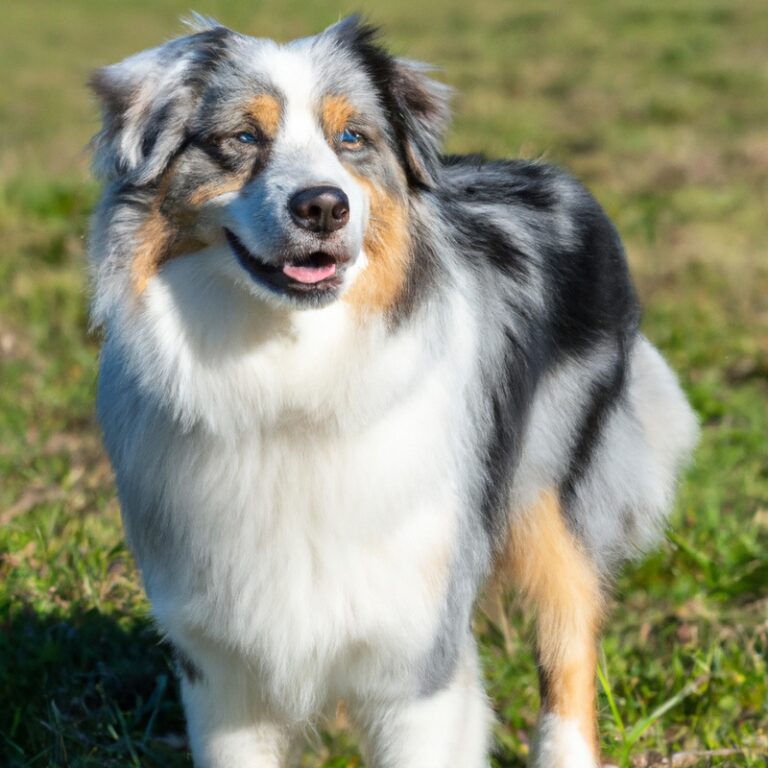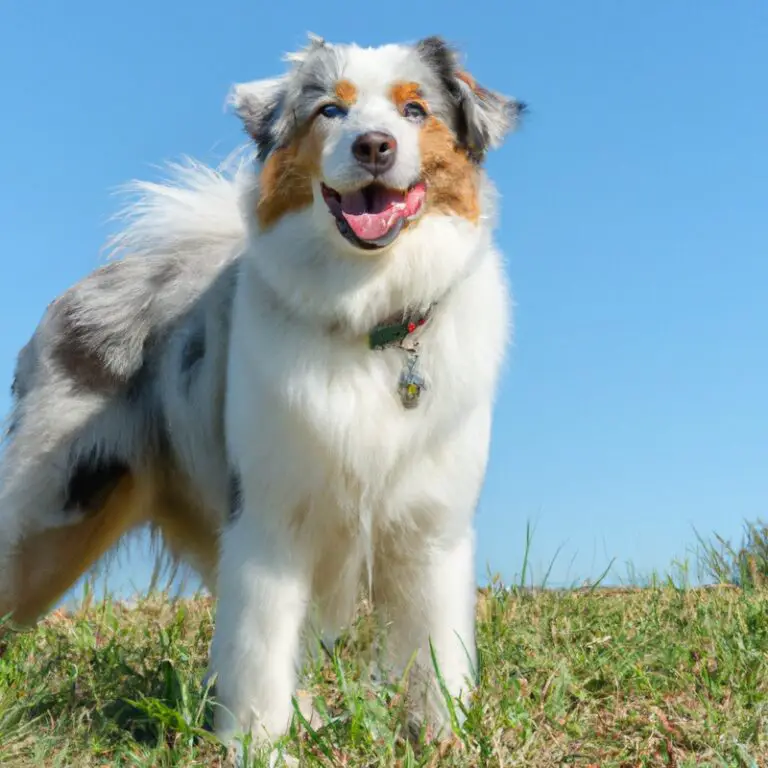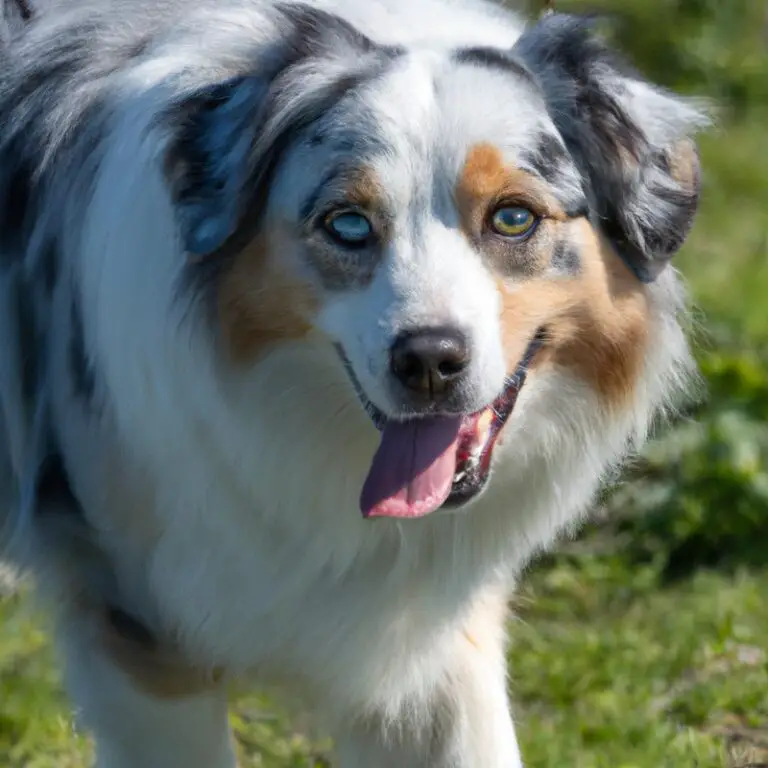How Do Australian Shepherds Behave Around Small Children?
Key Takeaways:
- Australian Shepherds are generally good with small children and have a natural herding instinct.
- These dogs are known to be gentle, protective, and patient with kids.
- Early socialization and proper training play a crucial role in shaping the behavior of Australian Shepherds around children.
- It is important for parents to supervise interactions between Australian Shepherds and small children to ensure a safe and positive environment.
Are you considering adding an Australian Shepherd to your family but worried about how they’ll behave around your little ones? Well, let me put your mind at ease.
As a self-proclaimed Aussie enthusiast and dog behavior expert, I can assure you that Australian Shepherds are top contenders for family-friendly dogs.
With their intelligence, adaptability, and natural herding instincts, these lovable furballs have plenty of qualities that make them suitable companions for children. However, it’s essential to address some potential challenges and the importance of early training and socialization.
Stick around, and I’ll guide you through it all!
| Behavior | Response |
| Playfulness | Usually playful and gentle with small children |
| Protectiveness | May show protective behaviors towards children |
| Sensitivity | Tend to be sensitive to a child’s emotions |
| Energy Level | High energy, requires regular exercise |
| Adaptability | Generally adaptable to various household situations |
| Training | Respond well to consistent training techniques |
| Socialization | Needs early socialization to improve interaction with children |
| Supervision | Should always be supervised when interacting with young children |
Characteristics of Australian Shepherds that make them suitable for families
Intelligence and adaptability of Australian Shepherds
Australian Shepherds are highly intelligent and adaptable dogs. Their intelligence enables them to quickly learn and understand commands and tricks.
They are known for their problem-solving skills and ability to think independently.
This makes them excellent candidates for training and various dog sports, such as agility or obedience competitions. In addition to their intelligence, Australian Shepherds are also highly adaptable.
They can easily adjust to different living environments and lifestyles.
Whether you live in a small apartment or a large house with a yard, Australian Shepherds can adapt to their surroundings as long as they receive enough mental and physical stimulation. Their adaptable nature also allows them to get along well with different types of people and animals.
They are known for being friendly and sociable, making them a great choice for families.
Australian Shepherds are often good with children and can form strong bonds with them. However, it is important to supervise interactions between Australian Shepherds and small children to ensure everyone’s safety.
Overall, Australian Shepherds are intelligent and adaptable dogs that can fit well into different family situations.
Their intelligence allows for easy training, and their adaptability makes them flexible in various environments. If you provide them with the mental and physical stimulation they need, Australian Shepherds can be wonderful companions for families with children.
Australian Shepherds’ natural herding instincts and their impact on behavior
Australian Shepherds have strong natural herding instincts that greatly impact their behavior. Due to their breeding history as working dogs, they have a strong desire to control and gather things, including people and objects.
This instinct can manifest in various ways, such as nipping at heels or attempting to guide children in a herding fashion.
It’s important to understand that this behavior is not aggressive, but rather a result of their innate instincts. This herding instinct can also make them protective of their family, including children, which can be a positive trait.
However, it’s crucial to properly train and socialize Australian Shepherds to ensure their herding instincts are well-managed and appropriate in a domestic setting.
With early training and socialization, Australian Shepherds can develop a better understanding of boundaries and learn how to behave appropriately around children. It’s also important to provide them with plenty of mental and physical stimulation to prevent boredom, as their herding instincts can lead to behavioral issues if they are not adequately exercised and engaged.
By understanding and addressing their natural herding instincts, Australian Shepherds can be wonderful family pets.
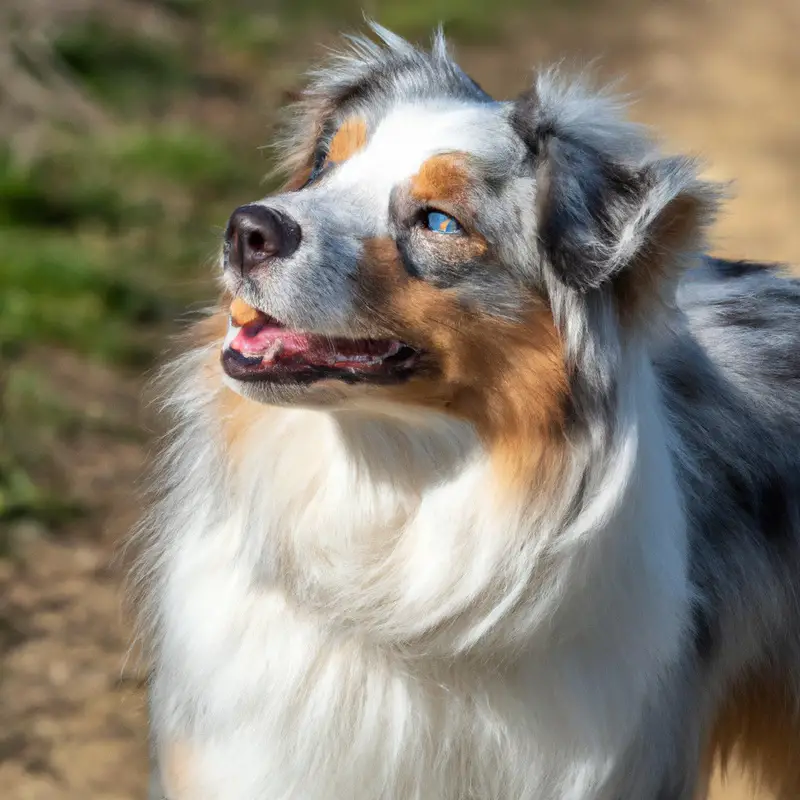
Australian Shepherds’ energy level and the need for exercise
Australian Shepherds have a high energy level and require regular exercise to stay happy and healthy. They were originally bred as working dogs so they have a lot of energy to burn.
Regular exercise helps to keep them mentally stimulated and prevents them from getting bored or anxious.
Australian Shepherds enjoy activities such as running, hiking, and playing fetch. Aim for at least 30 minutes to an hour of exercise each day.
This can be broken up into multiple sessions if needed.
It’s important to provide them with both physical and mental stimulation to keep them content.

Australian Shepherds’ behavior around small children
Australian Shepherds’ tendency to be protective of children
Australian Shepherds have a natural tendency to be protective of children. They are known to be loyal and affectionate towards their human family members, especially the little ones.
This protective instinct stems from their herding background, where they were responsible for keeping their flock safe and together.
When Australian Shepherds become a part of a family with small children, they often take on the role of a watchful guardian. They will keep a close eye on the children, make sure they are safe, and intervene if they sense any potential danger.
This protective behavior can manifest in various ways, such as staying close to the children, nudging or herding them away from hazardous situations, and even barking or growling to warn off perceived threats.
However, it is important to note that each Australian Shepherd’s personality and behavior can vary. Some may exhibit a stronger protective instinct than others, while some may be more laid-back.
It is essential to consider the individual dog’s temperament and upbringing when assessing their potential protective behavior towards children.
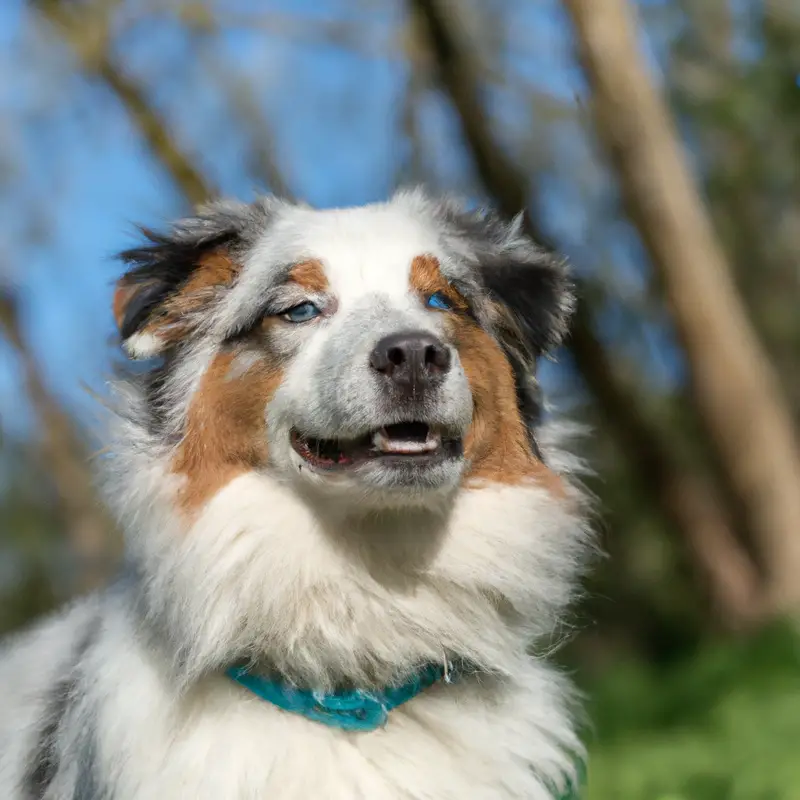
Potential challenges in Australian Shepherds’ behavior around small children
Australian Shepherds, like any other breed, may have some challenges in their behavior around small children. One potential challenge is their high energy level.
Australian Shepherds are known for their athleticism and need plenty of exercise.
If they don’t get enough physical activity, they may become restless and unintentionally knock over or bump into small children. Another challenge is their herding instincts.
Australian Shepherds were bred to herd livestock, and they may try to herd small children by nipping at their heels or trying to corral them.
This behavior can be overwhelming and potentially frightening for young children. Additionally, Australian Shepherds can be protective of their family, including small children.
While this can be a positive trait, it can also lead to overprotectiveness and possessiveness around small children.
It’s important to provide proper socialization and training to ensure that they understand appropriate behavior and boundaries. Overall, with consistent training, socialization, and supervision, Australian Shepherds can be great companions for families with small children.
It’s essential to address these potential challenges early on and work with a professional trainer if needed to ensure a safe and harmonious relationship between Australian Shepherds and small children.
Effect of early training and socialization on Australian Shepherds’ behavior around children
Early training and socialization play a significant role in shaping Australian Shepherds’ behavior around children. When Australian Shepherds are exposed to positive experiences with children from a young age, they develop a comfort and familiarity that helps them interact in a calm and gentle manner.
Consistent training teaches them appropriate behaviors, such as being gentle and respecting personal space.
Socialization also helps them learn to tolerate and respond appropriately to the unpredictable nature of children’s movements and noises. With early training and socialization, Australian Shepherds can become well-behaved and reliable companions for children.
However, it’s important to note that individual personalities and experiences may still influence their behavior, so consistent guidance and monitoring are still necessary.
Tips for successfully integrating Australian Shepherds with small children
Supervision and monitoring during interactions
When it comes to supervising and monitoring interactions between Australian Shepherds and small children, it is crucial to prioritize safety. Always have a responsible adult present to closely watch over the interactions and intervene if necessary.
Keep a close eye on the body language of both the dog and the child.
Look for signs of discomfort or stress, such as growling, barking, or aggressive behavior. If you notice any warning signs, separate the dog and the child immediately to prevent any potential incidents.
Teach your child how to properly behave around the Australian Shepherd.
Explain that they should not pull the dog’s ears or tail, climb on them, or attempt to ride them. Encourage gentle, respectful interactions and supervise their playtime together.
Create a safe and comfortable environment for both the children and the Australian Shepherd.
Set up designated areas for the dog and the child to have their own space when needed. Remember, supervision and monitoring are crucial to ensure the safety and well-being of both the Australian Shepherd and the small child.
By closely watching and actively participating in their interactions, you can help foster a positive and safe relationship between them.
Providing a safe and comfortable environment for both children and Australian Shepherds
When it comes to creating a safe and comfortable environment for both children and Australian Shepherds, there are a few key things to remember. Firstly, it’s important to establish clear boundaries and rules for both the children and the dog.
This helps to ensure that everyone understands what is expected of them and reduces the risk of any accidents or misunderstandings.
Secondly, it’s crucial to provide a designated space for the dog, such as a crate or a specific room, where they can retreat to when they need some alone time or a break from the children. This allows them to have their own space and reduces the likelihood of any conflicts.
Thirdly, it’s essential to supervise any interactions between the children and the dog.
This helps to prevent any rough handling or accidental harm and allows for immediate intervention if necessary. In addition to these points, it’s also important to provide regular exercise and mental stimulation for the dog to prevent them from becoming bored or restless.
This can include activities such as walks, playtime, and training sessions.
Addressing common concerns and misconceptions
Significance of breed-specific traits versus individual personality
The significance of breed-specific traits versus individual personality is an important consideration when understanding a dog’s behavior. While breed-specific traits can provide a general understanding of a dog’s tendencies, it is crucial to remember that each dog has its own unique personality.
Breed-specific traits, such as herding instincts in Australian Shepherds, can give us a general idea of how they may interact with children.
For example, Australian Shepherds are known for their protective nature, which can make them excellent companions for small children. However, it is important to note that individual personalities can vary, and not all Australian Shepherds will behave in the same way.
Understanding a dog’s individual personality is equally important.
Some Australian Shepherds may naturally be more nurturing and gentle with children, while others may be more energetic and rambunctious. It is essential to take the time to get to know your specific dog and observe their behavior around children.
By recognizing the significance of both breed-specific traits and individual personalities, we can better understand and respond to a dog’s behavior.
This understanding allows us to tailor training and socialization efforts to meet the specific needs of our dogs, ensuring a safe and harmonious environment for both children and pets. If you are unsure about how to handle a certain behavior or have concerns about your Australian Shepherd’s behavior around children, it is always a good idea to seek professional guidance.
The importance of individual training and behavior modification for Australian Shepherds
Individual training and behavior modification play a key role in shaping the behavior of Australian Shepherds. These intelligent and highly energetic dogs require consistent and personalized training to ensure they develop into well-mannered and balanced companions.
By focusing on individual training, we can address specific behavioral issues and tailor our approach to meet the unique needs of each Australian Shepherd.
This approach allows us to address any potential challenges that may arise, such as herding instincts or protectiveness towards children. Behavior modification is crucial for Australian Shepherds to learn appropriate behaviors and reactions in various situations.
Through positive reinforcement and consistent training, we can teach them how to interact safely and calmly around small children.
This helps to prevent any unwanted behaviors or potential accidents. It is important to start training and behavior modification from an early age.
By providing proper socialization with children and other animals, Australian Shepherds can develop positive associations and learn how to behave appropriately in different environments.
While individual training and behavior modification are essential, it is equally important for owners to seek professional guidance when needed. A qualified dog trainer or behaviorist can provide expert advice and techniques to address specific challenges or concerns.
Remember, training and behavior modification are ongoing processes.
Consistency, patience, and positive reinforcement are key in shaping Australian Shepherds into well-behaved and happy members of the family. With proper training, these loving and loyal dogs can thrive in a household with small children.
Seeking professional guidance when needed
Seeking professional guidance is essential when it comes to understanding and addressing any concerns or challenges with your Australian Shepherd’s behavior around small children. It is important to consult with a professional dog trainer or animal behaviorist who has experience working with this breed.
They can provide valuable insights, personalized advice, and effective training strategies specific to your situation.
Additionally, they can assess your dog’s behavior and help identify any potential underlying issues that may need to be addressed. Remember, professional guidance can help ensure the safety and well-being of both your Australian Shepherd and your children.
Final Verdict
Australian Shepherds possess a unique combination of traits that make them well-suited for families with small children. Their intelligence and adaptability allow them to easily integrate into the family dynamic, while their natural herding instincts can positively influence their behavior around children.
However, it is crucial to address potential challenges through early training and socialization.
By supervising interactions, teaching children how to behave around the breed, and providing a safe environment, successful integration is possible. It is important to note that individual training and behavior modification should be prioritized over generalizing breed-specific traits.
Seeking professional guidance when needed ensures the well-being of both the children and Australian Shepherds.
Trust in the inherent nature and potential of this breed, and with the right approach, they can become loyal and loving companions for your family.


